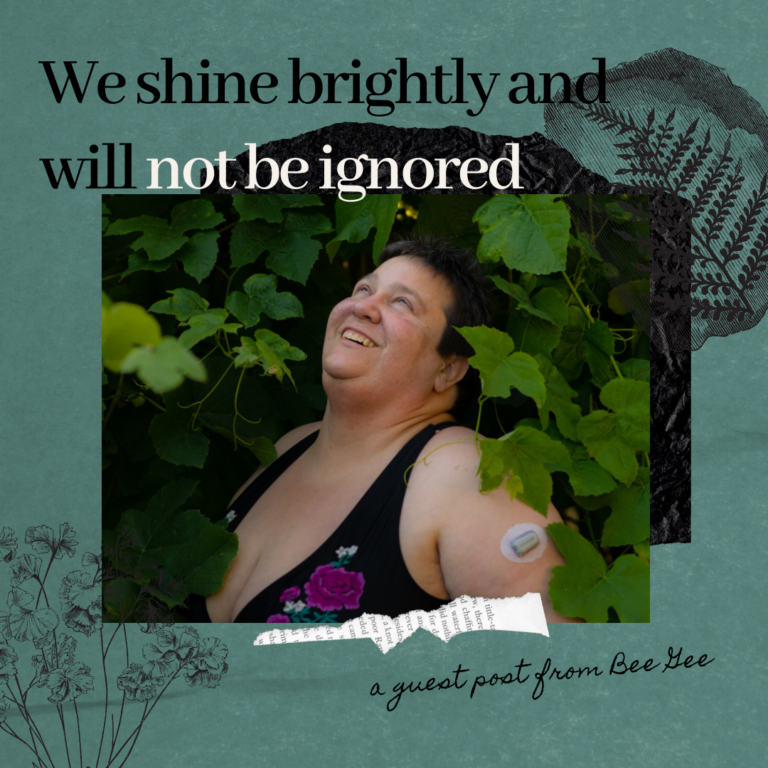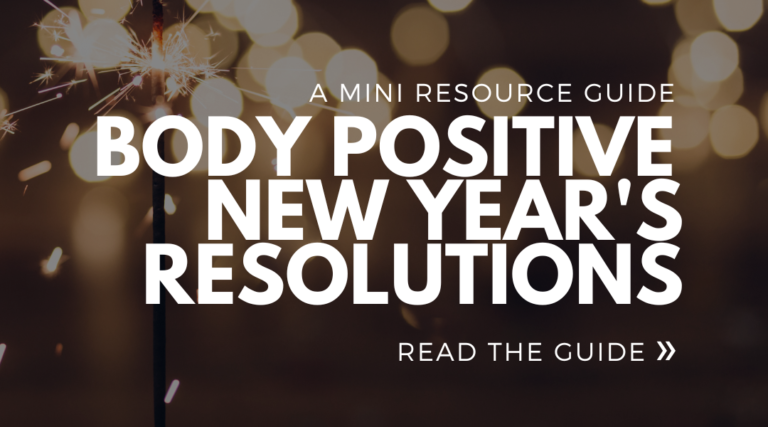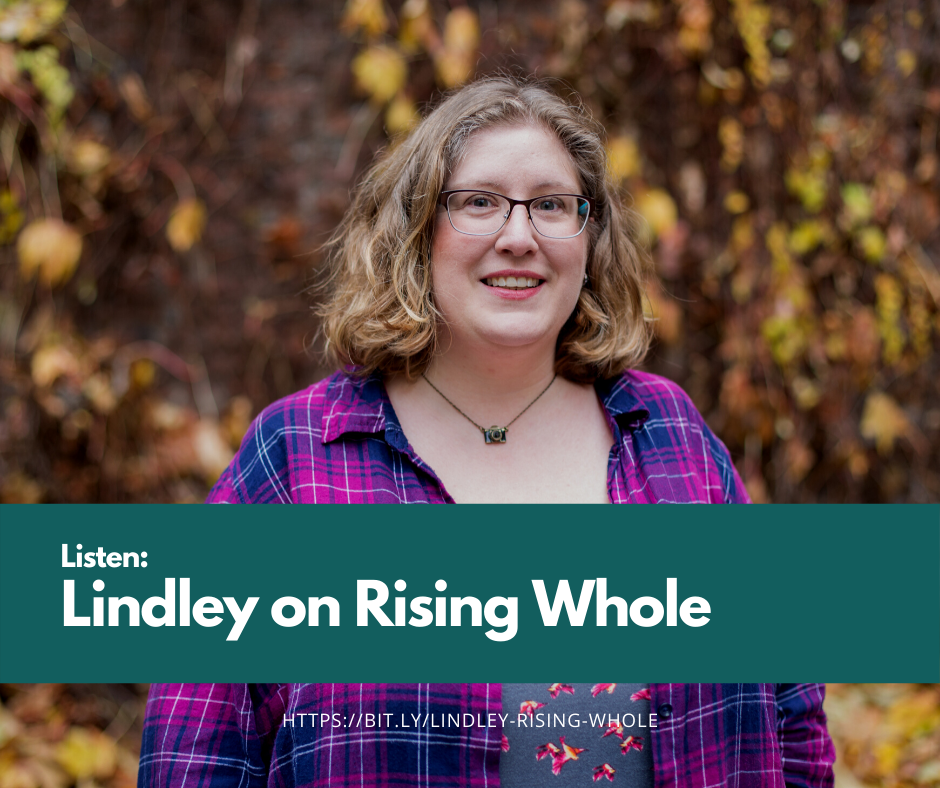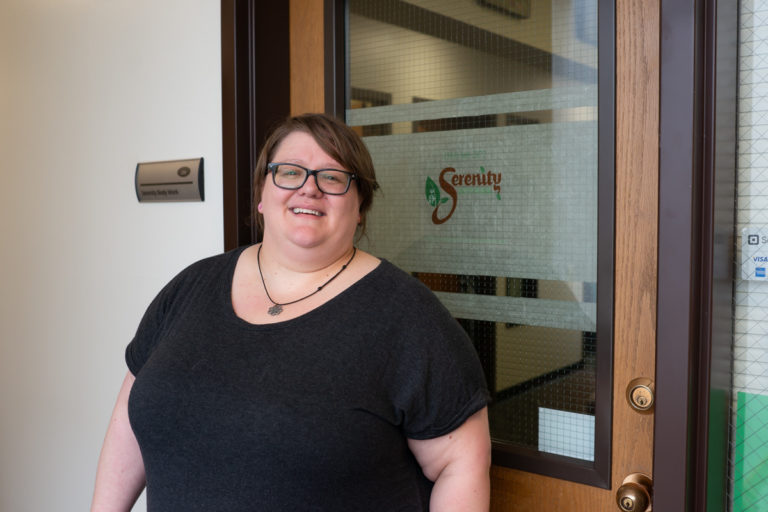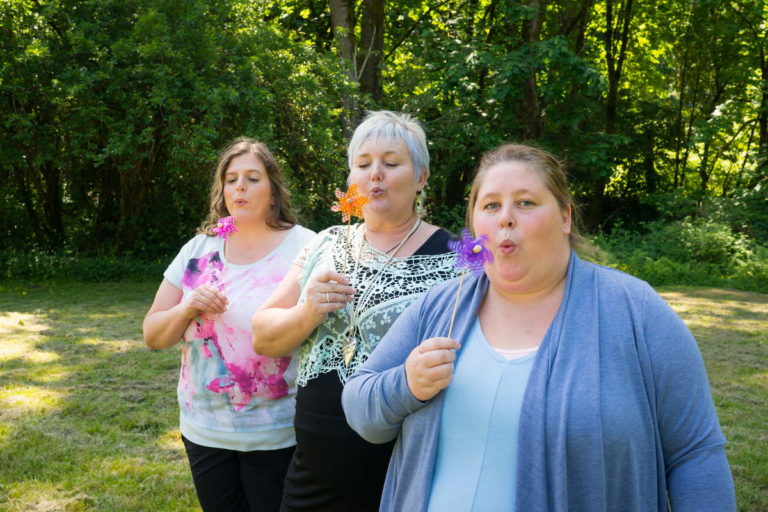25+ Weight Neutral and Health at Every Size Resources for Managing Diabetes
Some days, caring for our fat bodies looks exactly like caring for any human body. On other days, we may need a little extra something to carry on.
When it comes to chronic health conditions like diabetes, though, caring for a fat body can be very different.
Why? Because fat bodies are subject to weight stigma: discrimination against those at higher weights. And weight stigma means that when we try to get help or access resources to care for ourselves, we’re often turned away entirely with admonitions to “just lose weight.”
Since we don’t have an evidence-based method of making larger bodies smaller in the long term — most people will regain all the weight they lost within three years, and two-thirds of them will gain more than they lost — we need real resources that are weight-neutral and help us care for the bodies we have right now.
(And let me be clear: larger bodies are not in themselves ill, diseased or wrong. There are no health conditions that only affect big bodies.)
So what’s a larger-bodied person to do?
Here are over 20 practical resources — including articles, podcasts, support groups and programs — to help you deal with diabetes that are based on scientific evidence and working with your existing, worthy body.
(Looking for resources for other kinds of chronic illness? Check this post.)
Groups, Organizations & Programs
Articles, E-books and Other Resources
Can you reduce diabetes risk without weight loss?
“When someone gets a diagnosis of diabetes or prediabetes, the first advice they’ll probably receive is to lose weight. But is weight loss the only option? Is it the best option? Is it even necessary? What if you’ve already spent years trying in vain to lose weight and keep it off?”
Read more: https://www.seattletimes.com/life/wellness/can-you-reduce-diabetes-risk-without-weight-loss/
Prediabetes: The epidemic that never was, and shouldn’t be
“It’s also unclear if the predictive value of prediabetes is actually valuable. The most recent long-term epidemiological surveys show that only 5 to 10 percent of patients labeled prediabetic actually progress to diabetes, with a full 50 percent of people reverting to normal glycemia in follow-up visits. This may be why the WHO and International Diabetes Federation have effectively de-adopted the “prediabetes” lexicon, noting that “so many people do not progress to diabetes as the term implies.”
Study Shows Link Between Discrimination and Type 2 Diabetes
“The study found that those who reported two or more major discrimination experiences had a 34% increased risk of diabetes (over nine years) than those with no reported experience of major discrimination.
While this study is correlational, there is no downside risk to NOT discriminating against marginalized people, so ending discrimination is something we could implement now as a public health priority.”
Read more: https://danceswithfat.org/2017/05/11/study-shows-link-between-discrimination-and-type-2-diabetes
Big Fat Science: “I was recently diagnosed with type two diabetes”
The Weight Inclusive Approach to Gestational Diabetes
“How do we actually promote holistic health – body and mind – for mothers and newborns in an evidence-based way when gestational diabetes is thrown into the mix?”
Read more: https://www.feedyourzest.com/blog/2019/7/16/weight-inclusive-approach-gestational-diabetes
What Venn diagrams can teach us about diabetes
“Most people don’t realize that there are more similarities than differences between the two main types of diabetes (type 1 and type 2). Plus, as most of my clients know, I really love Venn diagrams. Let’s see what we can find when we put these together.”
Read more: https://www.erinphillipsnutrition.com/post/what-venn-diagrams-can-teach-us-about-diabetes
You Can’t Sweets Your Way Into Diabetes
“As my line of questioning quickly turned into the self-blame game, my doctor said something that changed my outlook on my diagnosis.
He said, ‘For you, it wasn’t a matter of if you would get diabetes, it was a matter of when.’”
Read more: https://www.healthline.com/health/diabetes/sugar-doesnt-cause-diabetes?#1
Diabetes Myth Busting with Lauren Newman
“Think sugar causes diabetes? Think again. Diabetes is such a misunderstood disease that I knew it deserved its own episode on the podcast. Even though people seem wholly confused about how Health At Every Size and intuitive eating can apply to those diagnosed with diabetes, the truth is, they’re completely compatible.”
Listen to the podcast: https://shohrehdavoodi.com/diabetes-intuitive-eating
Gestational Diabetes Resources
Registered dietitian nutritionist (RDN) McKenzie Caldwell often writes about diabetes from a weight-neutral standpoint on her blog.
Read more: https://www.feedyourzest.com/search?q=diabetes
Weight-Neutral Diabetes Resources
RDN Glenys Oyston has weight-neutral diabetes resources available on her blog.
Read more: https://daretonotdiet.com/?s=diabetes
Diabetes on the Love, Food Podcast
Julie Duffy Dillon’s podcast focuses on diabetes in episodes 216-219.
Listen: https://podcasts.apple.com/us/podcast/the-love-food-podcast/id1076673018
Intuitive Eating for Diabetes
A diagnosis of diabetes and intuitive eating may feel like they conflict, especially with all the rigid advice out there. In reality, intuitive eating for diabetes is possible. In this post, learn about why intuitive eating is a natural fit for diabetes management.
Read more: https://www.rachaelhartleynutrition.com/blog/intuitive-eating-for-diabetes
Intentional Weight Loss and Longevity in Overweight Patients with Type 2 Diabetes: A Population-Based Cohort Study
This study examined the influence of weight loss on long-term morbidity and mortality in overweight patients with type 2 diabetes and tested the hypothesis that therapeutic intentional weight loss supervised by a medical doctor prolongs life and reduces the risk for cardiovascular disease in these patients.
Read more: https://journals.plos.org/plosone/article?id=10.1371%2Fjournal.pone.0146889
SoCal Nutrition and Wellness: Root Causes of Diabetes
There are many Root Causes of Diabetes. Spoiler: Sugar intake is not one of them!
Find the post here: https://www.instagram.com/p/B4ionUuFApK/
The difference between type 1 and type 2 diabetes is not who “caused” their diabetes and who didn’t.
Your health has way more to do with factors out of your control: genetics, socioeconomic status, childhood trauma than it has to do with anything you have done, are doing, or will do.
Read the post here: https://www.instagram.com/p/B42SDN3lmWe/
The fact that you can have well-managed diabetes and eat carbs shouldn’t be revolutionary.
It’s true! Diabetes (of. all. types.) doesn’t require restricting carbs.
See post here: https://www.instagram.com/p/CCuo-2vpEml/
I’ve been diagnosed with diabetes… Can I still work on healing my relationship with food?
Traditional treatment for diabetes is often “eat more of this,” “eat less of that,” rules rules rules. Treatment for an eating disorder includes working on getting rid of rules and increasing flexibility. No wonder healing and treatment for these two conditions can feel like they’re pulling you so hard in opposite directions that you might break in half. If you are in this position right now, know that I am sending you loads and loads of compassion.
People with diabetes are more likely to have disordered eating.
Depending on which study you look at, up to 40% of people with type 2 diabetes report disordered eating behavior, and as much as 50% of people with type 1 diabetes. And it’s no wonder: the advice people with diabetes typically receive about managing their condition emphasizes control and restriction of food, and careful tracking of numbers relating to eating, blood sugar, and weight. Well-meaning medical providers stoke shame and fear about weight, eating, and health risks as a means of “motivating” their patients.
See the full post here: https://www.instagram.com/p/B4kOt7blemE/
Myth: People with Diabetes Can’t Use Intuitive Eating
The truth is that Intuitive Eating is really helpful for people with diabetes, and the research bears that out.
Consider this study comparing mindful eating and conventional diabetes self-management interventions for diabetes: both were equally helpful at improving blood sugar.
See the full post here: https://www.instagram.com/p/B40BEkoFCAc/
The Link Between Mental Trauma and Diabetes
“When we are under stress we are more likely to get sick, but women with PTSD are in this extreme stress response a lot of the time,” says study author Karestan Koenen, an epidemiology professor at Columbia University’s Mailman School of Public Health. The new study, published in the journal JAMA Psychiatry, looked at 49,739 women participating in the Nurses’ Health Study II to assess the link between PTSD symptoms and type 2 diabetes over 22 years. They found that women with the most symptoms had double the risk of developing type 2 diabetes and that the association increased based on the number of symptoms women experienced.”
See the full post here: https://time.com/3656362/the-link-between-mental-trauma-and-diabetes/
Adverse Childhood Events (ACEs) and Links to Diabetes Risk Factors
“If you’re never heard of adverse childhood events (also called ACEs), you’re not alone. When we talk about risk factors for diabetes and other chronic health conditions, we often highlight diet and exercise. All too often other risk factors like your education level, social-economic status (a fancy way of saying how much money you make), etc. are downplayed or ignored.”
See the full post here: https://type2diabetes.com/living/adverse-childhood-events
Posttraumatic Stress Disorder and Incidence of Type 2 Diabetes Mellitus in a Sample of Women
“Type 2 diabetes, self-reported and confirmed with self-report of diagnostic test results, symptoms, and medications, a method previously validated by physician medical record review. Post”traumatic stress disorder was assessed by the Short Screening Scale for DSM-IV PTSD. We examined longitudinal assessments of body mass index, smoking, alcohol intake, diet quality, physical activity, and antidepressant use as mediators of possible increased risk of T2D for women with PTSD. The study hypothesis was formulated prior to PTSD ascertainment.
See the full post here: https://jamanetwork.com/journals/jamapsychiatry/fullarticle/2088152
Intuitive eating is associated with glycemic control in type 2 diabetes
“A total of 179 individuals, mostly female and elderly, and predominantly taking oral antidiabetic drugs without association with insulin were evaluated. In adjusting for the total scale score, the most intuitive eating was associated with lower chances of patients presenting inadequate glycemic control by 89% (OR = 0.114; CI 0.024-0.540; p = 0.006), and a higher score on the Body-Food-Choice Congruence subscale was associated with lower chances of participants presenting this inadequacy by almost 66% (OR = 0.341; CI 0.131-0.891; p = 0.028), regardless of their body mass index.”
FOOD PSYCH #224: DIABETES, DIET CULTURE, AND INTUITIVE EATING FOR BLOOD-SUGAR STABILITY WITH LAUREN NEWMAN
“Fellow anti-diet dietitian Lauren Newman joins us to discuss how to manage diabetes without weight loss and restriction, why the restrict-binge cycle and weight cycling are especially harmful to blood-sugar regulation, why carbohydrates are necessary for health, how to take the focus away from nutritional minutiae and numbers, and so much more. “
Health At Every Size®-Based Guides for Blame-Free, Shame-Free Explanations of Common Medical Conditions
“When you live in a larger body, you are met with fatphobia and shaming from the very people you are there to receive treatment from. They fail to treat–or take seriously–the symptoms you are concerned with by focusing instead on your body size by suggesting that weight loss is your only treatment option.”
“These sheets were created as a way to give weight-neutral, evidence-based care options for common health conditions.
They are meant to be used by you, the patient, as reference materials to gain knowledge and advocate for yourself and others; and as resources for healthcare practitioners who are interested in creating more inclusive practices by gaining a better understanding of weight-neutral care options.”
Read more: https://haeshealthsheets.com/
Intuitive Eating for Diabetes: Part 1
“A diagnosis of diabetes and intuitive eating may feel like they conflict, especially with all the rigid advice out there. In reality, intuitive eating for diabetes is possible. In this post, learn about why intuitive eating is a natural fit for diabetes management.”
Read more: https://www.rachaelhartleynutrition.com/blog/intuitive-eating-for-diabetes
Eat What You Love, Love What You Eat with Diabetes: A Mindful Eating Program for Thriving with Prediabetes or Diabetes by Michelle May MD
“After receiving a diagnosis of pre-diabetes or diabetes, it may seem that the days of “eating what you love” are over. Understanding dietary changes, blood glucose monitoring, and prevention of complications can feel scary and overwhelming. Eat What You Love, Love What You Eat with Diabetes builds on the principles in Dr. Michelle May’s book series, Eat What You Love, Love What You Eat, to help readers with prediabetes or diabetes reduce their anxiety about diabetes self-management.”

Let’s dig deep.
Every Monday, I send out my Body Liberation Guide, a thoughtful email jam-packed with resources for changing the way you see your own body and the bodies you see around you. And it’s free. Let’s change the world together.
Hi there! I'm Lindley. I create artwork that celebrates the unique beauty of bodies that fall outside conventional "beauty" standards at Body Liberation Photography. I'm also the creator of Body Liberation Stock and the Body Love Shop, a curated central resource for body-friendly artwork and products. Find all my work here at bodyliberationphotos.com.



